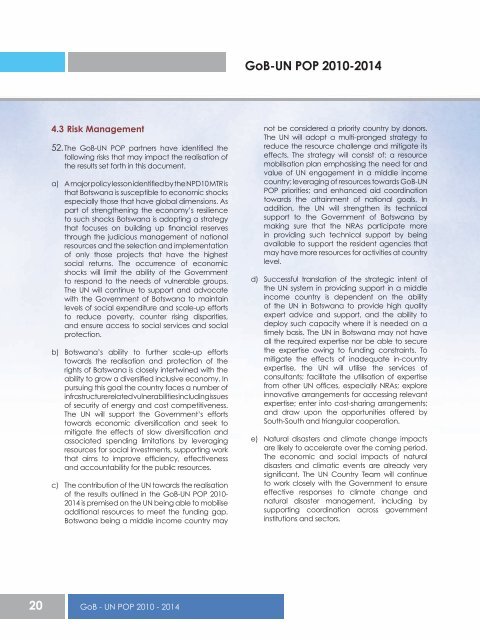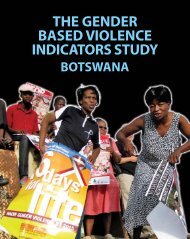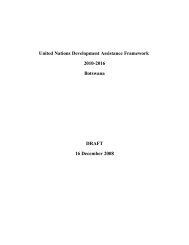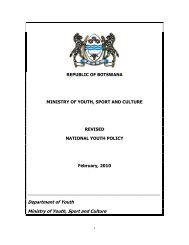GoB-UN POP 2010-2014 - UNFPA Botswana
GoB-UN POP 2010-2014 - UNFPA Botswana
GoB-UN POP 2010-2014 - UNFPA Botswana
- No tags were found...
Create successful ePaper yourself
Turn your PDF publications into a flip-book with our unique Google optimized e-Paper software.
<strong>GoB</strong>-<strong>UN</strong> <strong>POP</strong> <strong>2010</strong>-<strong>2014</strong>4.3 Risk Management52. The <strong>GoB</strong>-<strong>UN</strong> <strong>POP</strong> partners have identified thefollowing risks that may impact the realisation ofthe results set forth in this document.a) A major policy lesson identified by the NPD10 MTR isthat <strong>Botswana</strong> is susceptible to economic shocksespecially those that have global dimensions. Aspart of strengthening the economy’s resilienceto such shocks <strong>Botswana</strong> is adopting a strategythat focuses on building up financial reservesthrough the judicious management of nationalresources and the selection and implementationof only those projects that have the highestsocial returns. The occurrence of economicshocks will limit the ability of the Governmentto respond to the needs of vulnerable groups.The <strong>UN</strong> will continue to support and advocatewith the Government of <strong>Botswana</strong> to maintainlevels of social expenditure and scale-up effortsto reduce poverty, counter rising disparities,and ensure access to social services and socialprotection.b) <strong>Botswana</strong>’s ability to further scale-up effortstowards the realisation and protection of therights of Batswana is closely intertwined with theability to grow a diversified inclusive economy. Inpursuing this goal the country faces a number ofinfrastructure related vulnerabilities including issuesof security of energy and cost competitiveness.The <strong>UN</strong> will support the Government’s effortstowards economic diversification and seek tomitigate the effects of slow diversification andassociated spending limitations by leveragingresources for social investments, supporting workthat aims to improve efficiency, effectivenessand accountability for the public resources.c) The contribution of the <strong>UN</strong> towards the realisationof the results outlined in the <strong>GoB</strong>-<strong>UN</strong> <strong>POP</strong> <strong>2010</strong>-<strong>2014</strong> is premised on the <strong>UN</strong> being able to mobiliseadditional resources to meet the funding gap.<strong>Botswana</strong> being a middle income country maynot be considered a priority country by donors.The <strong>UN</strong> will adopt a multi-pronged strategy toreduce the resource challenge and mitigate itseffects. The strategy will consist of: a resourcemobilisation plan emphasising the need for andvalue of <strong>UN</strong> engagement in a middle incomecountry; leveraging of resources towards <strong>GoB</strong>-<strong>UN</strong><strong>POP</strong> priorities; and enhanced aid coordinationtowards the attainment of national goals. Inaddition, the <strong>UN</strong> will strengthen its technicalsupport to the Government of <strong>Botswana</strong> bymaking sure that the NRAs participate morein providing such technical support by beingavailable to support the resident agencies thatmay have more resources for activities at countrylevel.d) Successful translation of the strategic intent ofthe <strong>UN</strong> system in providing support in a middleincome country is dependent on the abilityof the <strong>UN</strong> in <strong>Botswana</strong> to provide high qualityexpert advice and support, and the ability todeploy such capacity where it is needed on atimely basis. The <strong>UN</strong> in <strong>Botswana</strong> may not haveall the required expertise nor be able to securethe expertise owing to funding constraints. Tomitigate the effects of inadequate in-countryexpertise, the <strong>UN</strong> will utilise the services ofconsultants; facilitate the utilisation of expertisefrom other <strong>UN</strong> offices, especially NRAs; exploreinnovative arrangements for accessing relevantexpertise; enter into cost-sharing arrangements;and draw upon the opportunities offered bySouth-South and triangular cooperation.e) Natural disasters and climate change impactsare likely to accelerate over the coming period.The economic and social impacts of naturaldisasters and climatic events are already verysignificant. The <strong>UN</strong> Country Team will continueto work closely with the Government to ensureeffective responses to climate change andnatural disaster management, including bysupporting coordination across governmentinstitutions and sectors.20 <strong>GoB</strong> - <strong>UN</strong> <strong>POP</strong> <strong>2010</strong> - <strong>2014</strong>







